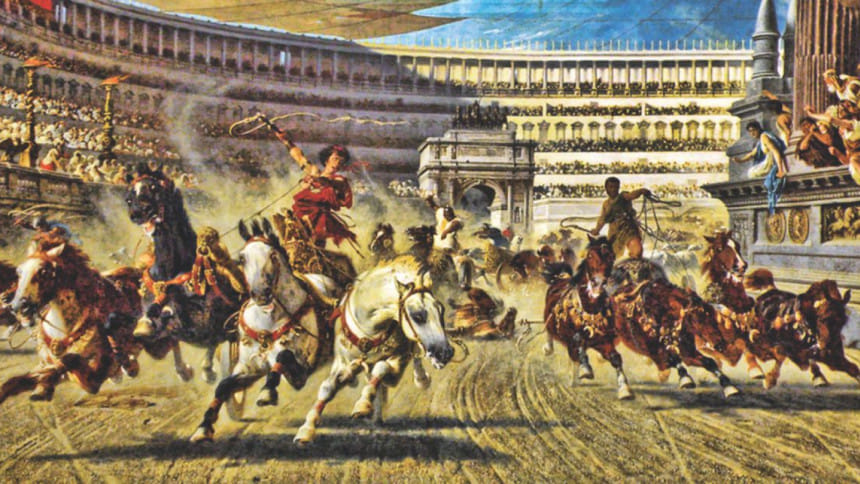WHEN SPORTS CLUBS - TRIED REPLACING AN EMPEROR

Long before it became Istanbul, Constantinople was the capital of the Byzantine Empire. Its ruler in 532 AD was Justinian I, making him arguably the most powerful person on Earth. The greatest threat to his reign came not from barbarians to the west or Persians to the east, but from two local sports teams called the Blues, and the Greens. These were the colours worn by the two most popular teams of chariot-racers, and their many fans.
The Blues and the Greens were more than fan clubs – they were full-fledged political factions. Chariot races were not as strange a context for politics as you may think, for Justinian I was as crazy about the games as anyone else and would regularly attend, making the Hippodrome (where the races were held) a rare platform for the masses to shout their opinions and slogans at him. They had opinions on everything ranging from the social to the theological to the political – and even on who should be Emperor. The latter owed not a little to the fact much of the aristocracy were supporters of the teams as well, Justinian himself being a notable Blue. As civil tensions in Constantinople rose, the crowds at the games grew increasingly agitated in the presence of their Emperor, and the Blues and the Greens added murder and street violence to their activities. After one murderous incident, several culprits were caught and hanged, but a Blue and a Green escaped and managed to hide in a church surrounded by an angry mob.
Justinian elected to defuse the tricky situation: the death sentence was changed to mere imprisonment, and he declared a race to calm everyone down. The Blues and the Greens did not accept this and demanded the men be pardoned altogether.
This race was held on January 13, 532 AD, and it started off with the crowd jeering at Justinian (who was watching from the safety of his balcony from the palace next door.) The Blues and the Greens alternated insults with chanting their teams' names, but as the day wore on they united under a common slogan. They took to shouting, "Nika!" which meant "conquest". And then all hell broke loose.

The crowd went berserk and overpowered the guards, setting fire to the city and laying siege to the palace. Far from helping their Emperor, many in the senate saw this as an opportunity to enact regime change, and they armed the mob. In a completely unrelated coincidence the mob started to demand that Justinian a) fire people who had enacted policies unpopular with the senate and b) step down as Emperor. The poor sap they chose to replace him was one Hypatius, who had a strong blood claim to the throne but no apparent interest in it. However, Justinian made the bad call of ejecting him from the safety of the palace just in case, which meant that the crowd got their hands on him and proclaimed him the new emperor. Despite his initial misgivings and his wife's advice, Hypatius started to get into the role. He was a Green.
Justinian, in contrast, was a wiser man than to ignore the woman he was married to. The palace had been under siege for five days and during that time several troops had tried, and failed, to stop the riots. Justinian himself had appealed to the masses from his balcony, to no avail, and meanwhile the arson was destroying most of Constantinople. Escape seemed the most prudent course of action to the falling emperor, but it was his wife Theodora, a former actress, who reminded him of his duty as emperor and told him to man up. This convinced Justinian to come up with the best plan ever.
His plan involved three generals: Narses, Belisarius and Mundus. On the day of Hypatius' coronation as Emperor, Narses entered the Hippodrome alone, right into the heart of the mob. Nonchalantly the eunuch walked directly to the section occupied by the Blues and their leaders. Distributing a bag of gold among the Blue leaders, he reminded them that Justinian was Blue down to the bone and Hypatius was a filthy Green. This, and the money, were powerful arguments in Justinian's favour, so the Blues abandoned the Hippodrome rather than fight longer against their biggest fan. This would have been a heart-warming story about the unitive power of sport, if Belisarius and Mundus hadn't then charged the Hippodrome with their troops and slaughtered the remaining Greens.

By the end of the Nika Riots, about 30,000 people had been slain, and much of the city burned down. However, this had only done Justinian favours: he had an excuse to have his political opponents executed (including the luckless Hypatius, at Theodora's insistence) and got to win the public over by rebuilding landmarks destroyed by the mob. Theodora earned respect for her nerves of steel and crucial advice, and she and Justinian went onto become one of history's great power couples.
As to the Hippodrome, it fell into disuse and after the Ottoman Turks renamed Constantinople to Istanbul it had the privilege of being the site of days-long royal circumcision ceremonies. I doubt the crowd went wild.
Zoheb Mashiur is a prematurely balding man with bad facial hair and so does his best to avoid people. Ruin his efforts by writing to [email protected]

 For all latest news, follow The Daily Star's Google News channel.
For all latest news, follow The Daily Star's Google News channel. 



Comments